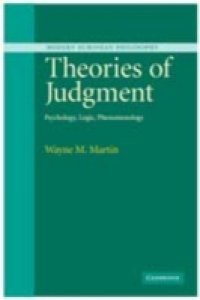The exercise of judgement is an aspect of human endeavour from our most mundane acts to our most momentous decisions. In this book Wayne Martin develops a historical survey of theoretical approaches to judgement, focusing on treatments of judgement in psychology, logic, phenomenology and painting. He traces attempts to develop theories of judgement in British Empiricism, the logical tradition stemming from Kant, nineteenth-century psychologism, experimental neuropsychology and the phenomenological tradition associated with Brentano, Husserl and Heidegger. His reconstruction of vibrant but largely forgotten nineteenth-century debates links Kantian approaches to judgement with twentieth-century phenomenological accounts. He also shows that the psychological, logical and phenomenological dimensions of judgement are not only equally important but fundamentally interlinked in any complete understanding of judgement. His book will interest a wide range of readers in history of philosophy, philosophy of the mind and psychology.

